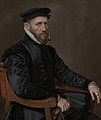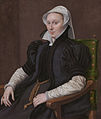Thomas Gresham
Thomas Gresham | |
|---|---|
 Portrait of Thomas Gresham, aged approximately 41. From the collection of the Rijksmuseum. | |
| Born | Thomas Gresham the Elder c. 1519 London, England |
| Died | 21 November 1579(aged 59–60) London, England |
| Resting place | St Helen's Church, Bishopsgate,London,England |
| Nationality | British |
| Education | Gonville and Caius College, Cambridge |
| Occupation(s) | Merchant,financier |
| Known for | Founder ofThe Royal ExchangeandGresham College |
| Spouse |
Anne Ferneley (m.1544) |
| Father | Sir Richard Gresham |
Sir Thomas Gresham the Elder(/ˈɡrɛʃəm/;c. 1519 – 21 November 1579) was an Englishmerchantandfinancierwho acted on behalf ofKing Edward VI(1547–1553) and Edward's half-sisters,queensMary I(1553–1558) andElizabeth I(1558–1603). In 1565 Gresham founded theRoyal Exchangein theCity of London.
Origins
[edit]Born inLondonand descended from an oldNorfolkfamily,Gresham was one of two sons and two daughters ofSir Richard Gresham,a leadingmerchant mercerandLord Mayor of London,who was knighted byKing Henry VIIIfor negotiating favourable loans with foreign merchants.[1]
Education
[edit]Gresham was educated atSt Paul's School.After that, although his father wanted Thomas to become a merchant, Sir Richard first sent him to university atGonville and Caius College, Cambridge.[2]He was concurrently apprenticed in the Mercers' Company to his uncleSir John Gresham,founder ofGresham's School,while he was still atCambridge.
Agent in the Low Countries
[edit]In 1543 theMercers' Companyadmitted the 24-year-old Gresham as aliveryman,and later that year he left England for theLow Countries,where, either on his own account or that of his father or uncle, he carried on business as amerchantwhilst acting in various matters asagentforKing Henry VIII.In 1544 he married Anne Ferneley, widow of the London merchant Sir William Read, but maintained residence principally in theLow Countries,basing his headquarters atAntwerp[1]in present-dayBelgium(then theSpanish Netherlands), where he became renowned for his adeptmarket-play.
Financial acumen
[edit]This sectionneeds additional citations forverification.(January 2023) |
Rescue of the pound
[edit]When in 1551 the mismanagement of SirWilliam Damsell,King's Merchant to the Low Countries, had caused the English Government much financial embarrassment, the authorities called Gresham for advice, thereafter following his proposals. Gresham advocated the adoption of various methods – highly ingenious, but quite arbitrary and unfair – for raising the value of thepound sterlingon theAntwerp boursewhich proved so successful that in just a few yearsKing Edward VIhad discharged almost all of his debts. The Government sought Gresham's advice in all their money difficulties, and also frequently employed him in various diplomatic missions. He had no stated salary, but in reward of his services received from King Edward various grants of lands, the annual value of which at that time amounted ultimately to about 400poundsa year.[1]
Later services to the Crown
[edit]On the accession ofQueen Maryin 1553, Gresham fell out of favour atCourtfor a short time withAldermanWilliam Dauntsey displacing him. But Dauntsey's financial operations proved unsuccessful and Gresham was soon reinstated; and as he professed his zealous desire to serve the Queen, and manifested great adroitness both in negotiating loans and in smuggling money, arms and foreign goods, not only were his services retained throughout her reign (1553–1558), but besides his salary of twenty shillingsper diemhe received grants ofchurch landsto the yearly value of 200 pounds.
UnderQueen Elizabeth's reign (1558–1603), besides continuing in his post as financial agent of the Crown, Gresham acted as Ambassador Plenipotentiary to theCourtofDuchess Margaret of Parma,Governor of the Netherlands,and was appointed aKnight Bachelorin 1559 prior to his departure. The unsettled times preceding theDutch revoltcompelled him to leaveAntwerpon 10 March 1567; but, though he spent the remainder of his life in London, he continued his business as merchant and government financial agent in much the same way as he had always done.[1]
Queen Elizabeth also found Gresham's abilities useful in a variety of other ways, including acting asgaolertoLady Mary Grey(sister ofLady Jane Grey), who, as a punishment for marryingThomas Keyesthe sergeant-porter, was imprisoned in his house from June 1569 to the end of 1572.[1]
Founding of the Royal Exchange
[edit]In 1565 Gresham made a proposal to theCity of London'sCourt of Aldermento build, at his own expense, abourseorexchange– what became theRoyal Exchange,modelled on theAntwerp bourse– on condition that theCorporationprovided for this purpose a suitable location. In this proposal he seems to have had a good eye for his self-interest as well as for the general good of the City's merchants, for by a yearly rental of £700 obtained for the shops in the upper part of the building he received more than sufficient return for his trouble and expense.[1]
The foundation of theRoyal Exchangeis the background ofThomas Heywood's play:If You Know Not Me, You Know Nobodypart 2,in which aLordextols the quality of the building when asked if he has ever seen "a goodlier frame":
Not in my life; yet I have been inVenice... In theRialtothere, calledSaint Mark's; 'tis but a bauble, if compared to this. The nearest, that which most resembles this, is the greatBurseinAntwerp,yet no comparable either in height or wideness, the fair cellarage, or goodly shops above. Oh myLord Mayor,this Gresham hath much graced your City of London; his fame will long outlive him.[3]
Marriage and progeny
[edit]In 1544 he married Anne Ferneley, widow of Sir William Read, a London merchant. By his wife he had an only son who predeceased him. He also had an illegitimate daughter who marriedSir Nathaniel Bacon(c.1546–1622), half-brother ofFrancis Bacon, 1st Viscount St Albans,becomingAnne, Lady Bacon.
Death and burial
[edit]Gresham died suddenly, apparently ofapoplexy,on 21 November 1579 and was buried atSt Helen's Church, Bishopsgatein theCity of London.[4]
Bequest for the foundation of Gresham College
[edit]Apart from some small sums to various charities, Gresham bequeathed the bulk of his property (consisting of estates in London and around England giving an income of more than £2,300 a year) to his widow and her heirs, with the stipulation that after her death his own house in Bishopsgate Street and the rents from theRoyal Exchangeshould be vested in theCorporation of Londonand theMercers Company,for the purpose of instituting a college in which seven professors should read lectures, one each day of the week, inastronomy,geometry,physic,law,divinity,rhetoricand music.[1]Thus,Gresham College,the first institution of higher learning in London, came to be established in 1597.
Gresham's law
[edit]Gresham's law(stated simply as: "Bad money drives out good" ) takes its name from him (although others, including the astronomerNicolaus Copernicus,had recognised the concept for years) because he urged Queen Elizabeth to restore the debased currency of England. However, Sir Thomas never formulated anything likeGresham's Law,which was the 1857 conception ofHenry Dunning Macleod,an economist with a knack for reading into a text that which was not written.[5]
The Gresham grasshopper
[edit]The Gresham familycrestis:On a Mount Vert a Grasshopper Or[6](a golden grasshopper on a green mound); it is displayed byGresham College,which he founded, and also forms theweathervaneon theRoyal Exchangein theCity of London,also founded by him in 1565. TheFaneuil HallatBoston,Massachusetts,has also borrowed thisheraldic device.The Greshamcoat of armsis blazoned:Argent, a Chevron Erminés between three Mullets pierced Sable.[7]
According to ancient legend, the founder of the family, Roger de Gresham, was a foundling abandoned as a new-born baby among long grass inNorfolkduring the 13th century and found there by a woman whose attention was drawn to the child by a grasshopper. Although a beautiful story, it is more likely that the grasshopper is simply acantingheraldiccrestplaying on the sound "grassh-" and "Gresh-". The Gresham family uses as itsmottoFiat Voluntas Tua('Thy will be done').[8]
Legacy
[edit]- Gresham's Law;
- The Royal Exchange,which he founded in 1565, was opened in 1571;
- Gresham College,funded by the bequest of his Will of 1571, was opened in 1597;
- Gresham Streetin theCity of Londonrunning east from St Martin's Le Grand nearSt Paul's Cathedral,past theGuildhalland theBank of Englandis named in his memory;
- The Gresham PalaceinBudapestis named after him;
- TheGresham Clubin the City was also named in his honour;
- TheGresham Hotel,Dublinis indirectly named after Gresham. It was established in 1817 by another Thomas Gresham, who was given that name as he was afoundlingabandoned on the steps of the Royal Exchange;
- Gresham Road, nearby Gresham'smansionatHounslow:Osterley Park.
In fiction
[edit]- Gresham appears as a background figure in a series of fictional mystery novels by the British authorValerie Anandwriting under thepen-nameof Fiona Buckley. The fictional heroine of the stories, Ursula Blanchard, lived inAntwerpwith her first husband while he worked as one of Gresham's agents.
- Gresham also features as the central character ofHerbert Strang's bookOn London River: A Story of the Days of Queen Elizabeth(Oxford University Press,1936).
Gallery
[edit]-
18th century engraving of Sir Thomas Gresham
-
Gresham's bust at
Stowe School -
Gresham's initials "TG" and date 1563 with his golden grasshopper emblem, serving as the sign of a bank[9]inLombard Street,the historic centre of banking in theCity of London
-
Sir Thomas & Lady Gresham's townhouse inBishopsgate Street
-
Sir Thomas Gresham, portraitc.1554 byAnthonis Mor
-
Dame AnnenéeFerneley, wife of Sir Thomas Gresham. Portraitc.1560 byAnthonis Mor
-
Intwood Hall,Gresham's Norfolk estate
-
Gresham arms:
Argent a Chevron Erminés between three Mullets pierced Sable -
Sir Thomas Gresham'smerchant's markas depicted in the 1544 portrait of him owned by theMercers' Company.Also as illustrated in Elmhirst, 1959,[10]with more pronounced "heart shape", used by other marks of this type,e.g.the laterHEICSmark
See also
[edit]Notes
[edit]- ^abcdefgChisholm 1911.
- ^"Thomas Gresham (GRSN530T)".A Cambridge Alumni Database.University of Cambridge.
- ^Heywood, Thomas,The Dramatic Works of Thomas Heywood,6 volumes, ed. J. Payne Collier, London: The Shakespeare Society, 1851.
- ^Memorials of the Institutions – St Helen's Bishopgate
- ^Roover, Raymond de,Gresham on Foreign Exchange,Cambridge: Cambridge University Press, 1949
- ^Burke's Armorials, 1884
- ^Burke's Armorials, 1884
- ^Granville William Gresham Leveson Gower, JP, DL, FSA,Genealogy of the family of Gresham(1883) p. 27
- ^Early banks all had distinctive signs displayed in this way, for example Lloyd's Bank in Birmingham was "the sign of the black horse", which usage survives
- ^Elmhirst, Edward Mars,Merchants' Marks,ed. Dow, Leslie, Harleian Society, 1959, p. 12, image no. 450
References
[edit]- This article incorporates text from a publication now in thepublic domain:Chisholm, Hugh,ed. (1911). "Gresham, Sir Thomas".Encyclopædia Britannica.Vol. 12 (11th ed.). Cambridge University Press.
- The Life and Times of Sir Thomas Greshamby J.W. Burgon (London, 1839, new edition 1968)
- Sir Thomas Gresham (1518–1579)by F. R. Salter (Parsons, London, 1925)
- Baynes, T. S., ed. (1875–1889)..Encyclopædia Britannica(9th ed.). New York: Charles Scribner's Sons.
- Welch, Charles (1890)..InStephen, Leslie;Lee, Sidney(eds.).Dictionary of National Biography.Vol. 23. London: Smith, Elder & Co.
- Blanchard, Ian. "Gresham, Sir Thomas (c.1518–1579)".Oxford Dictionary of National Biography(online ed.). Oxford University Press.doi:10.1093/ref:odnb/11505.(Subscription orUK public library membershiprequired.)
- John William Burgon,The life and times of Sir Thomas Greshamcomp. chiefly from his correspondence preserved in Her Majesty's state-paper office: including notices of many of his contemporaries. Published 1839 by R. Jennings in London. Volume I.
- John William BurgonThe life and times of Sir Thomas GreshamVolume II.
- Knight, Charles(1845).The Life of Sir Thomas Gresham: Founder of the Royal Exchange.Charles Knight & Co.
External links
[edit]- 1510s births
- 1579 deaths
- 16th-century English politicians
- Alumni of Gonville and Caius College, Cambridge
- Founders of English schools and colleges
- People from the City of London
- People educated at St Paul's School, London
- Gresham College
- 16th-century English merchants
- Ambassadors of England to the Netherlands
- Knights Bachelor
- Court of Edward VI
- People from Keswick, South Norfolk



![Gresham's initials "TG" and date 1563 with his golden grasshopper emblem, serving as the sign of a bank[9] in Lombard Street, the historic centre of banking in the City of London](https://upload.wikimedia.org/wikipedia/commons/thumb/d/de/Londres_-_Lombard_Street.JPG/120px-Londres_-_Lombard_Street.JPG)





![Sir Thomas Gresham's merchant's mark as depicted in the 1544 portrait of him owned by the Mercers' Company. Also as illustrated in Elmhirst, 1959,[10] with more pronounced "heart shape", used by other marks of this type, e.g. the later HEICS mark](https://upload.wikimedia.org/wikipedia/commons/thumb/e/e0/MerchantMark_ThomasGresham_1544.png/62px-MerchantMark_ThomasGresham_1544.png)
